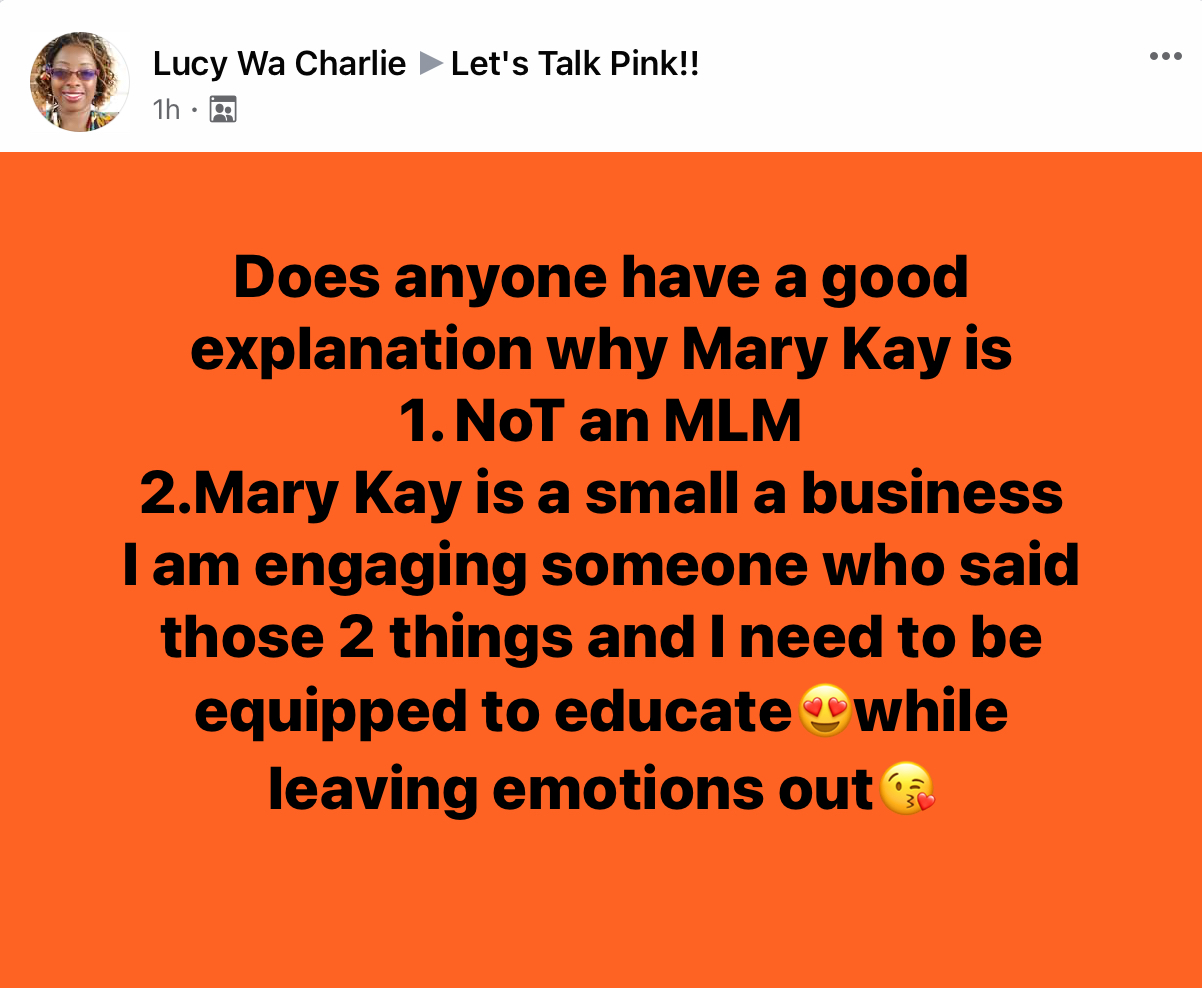MLM Versus Pyramid Schemes
This article comes from a site called StopSpam.org. The site’s primary purpose seems to be stopping email scams. However, they included this article which addresses the multi-level marketing (MLM) and pyramid scheme issue.
I think that Mary Kay falls under the “fraudulent multi-level marketing plan” category. Read the 13 points below and form your own opinion. I think a lot of the points hit the mark when it comes to MK.
Comparing Legitimate Multi-Level Marketing With Illegal Pyramid Schemes
Are There Profits In Pyramid Schemes? Don’t Bank On ItAre you under the impression that multi-level marketing plans are all pyramid schemes? Well, they’re not – after the widely publicized pyramiding scandals of the 1960’s which featured the flamboyant Glenn Turner and his “Koscot” and “Dare to Be Great” operations, legitimate Multi-Level-Marketing plans were approved in the late 1970s by the Supreme Court after a challenge by the FTC. Companies such as Amway, Herballife, Shakley, and several others were challenged, and the Supreme Court, after hearing the case, said that MLM distributing plans provided a new marketing method to provide goods and services to consumers, and were (and are) therefore legitimate.
Many people consider all MLMs to be “pyramids” – but they fail to make the distinction between “illegal” and “legal” pryamids, considering anything that is based upon a pyramid shape to be illegal – forgetting that their own job, the government, their church, and virtually every organization that they belong to or know of is top-down oriented and shaped as a pyramid. Shape of the organization alone has no bearing upon legality or illegality. Some of the definitions of an “illegal” pyramid include getting paid just to bring others into the scheme (“headhunter’s fees”), being locked in position (never being able to make more than the person above you), no legitimate product or service flowing, and where there is a product or service actually involved, requiring new recruits to purchase a substantial, non-returnable inventory to get started (“inventory loading”).
Legitimate multi-level-marketing plans are a way to sell real goods or services through distributors. These plans usually show that if you sign up to be a distributor, you will receive commissions – not only on your sales of the plan’s goods or services, but also on the sales of the people you recruit to join the distributors. One of the keys is that there are actually tangible products and services moving through the network, rather than just the building of the network or “building mailing lists” or “sending recipes” or “sending jokes,” etc., such as chain letters usually have you do.
Pyramid schemes have a similar structure, but a completely different focus. They concentrate on the commissions you could earn just for recruiting new distributors, and generally ignore the marketing and selling of products or services. The Federal Trade Commission requires a minimum of 10 non-distributor customers per month to be serviced by each distributor after a certain period – without these customers, it is an illegal pyramid.
Most countries outlaw pyramiding. The reason: Plans that pay commissions for recruiting new distributors inevitably collapse when new distributors can’t be recruited. When a plan collapses, most people – except perhaps those at the very top of the pyramid – lose their money.
Many “new” MLM plans are started by the same people who just closed down another one after they found the “Sheriff at the door.” Most operate for less than 2 years before they go out of business for one of several reasons:
- They were illegal and were caught up with by local or Federal law enforcement agencies
- They hawked a product or service that was not legitimate or desirable (believe it or not, there was one MLM hawking Herbal Enemas!) and could not sustain themselves
- They were started by a company who never intended them to continue (using MLM to introduce a product in the marketplace is very cheap, and once that market is established, the company decides it can make more money by then selling it through retail/wholesale storefronts, and thus bypasses its distributors and sells to those storefronts cheaper does to the distributors – effectively cutting the throats of those who built its business).
Here are tips to help you avoid losing money to an illegal pyramid scheme or a fraudulent multi-level marketing plan:
- Avoid plans with “Headhunter Fees” – any plan that offers commissions just for recruiting additional distributors. It is illegal to pay for simply signing others up.
- Avoid plans with “Front Loading” – plans that ask new distributors to spend money on high-priced inventory. These plans can collapse quickly – and also may be illegal pyramids in disguise. The requirement of a minor purchase of a set of initial business materials (order forms, catalogs, etc.) does not fall into this category.
- Avoid plans that are “Free to Join” – Use a little common sense – why in the world would anyone be offering to set you up in a business that costs them money and you absolutely nothing? There are hidden costs always around the corner in these “free” businesses, once they have snared you in. There is a saying that many go by (falsely) of “if you have to buy the kit, it ain’t legit” – that is absolutely the worst possible indicator of legitimacy. Any legitimate business is going to cost something to start. NO business of value is free to start – even a child’s Kool-Aid stand costs the parents the sugar, drink mix and cups that it takes to make and sell the drinks.
- Avoid plans that claim that you “don’t have to work hard” – although MLM is a different style of business than standard retail storefront type business , it is nonetheless hard work (in a different manner) to build your business – any claims to the contrary should raise red flags as to the veracity of anything else the claimant is telling you.
- Avoid plans that claim you will always make money because your downline will always grow – plans that claim you’ll make money through continued growth of your “downline” – the commissions on sales made by new distributors you recruit – instead of through sales you make yourself. No one can guarantee your downline business growth – ever. Again, it is your efforts that will cause this to happen or not happen – no other guarantees should be respected.
- Avoid “Snake Oil” plans – plans that promise enormous earnings or claim to sell miracle products. Just because a promoter of a plan makes a claim doesn’t mean it’s true! Ask the plan’s promoter to back up the claims with hard evidence – then verify that evidence to the best of your ability.
- Avoid Shills – “decoy” references that the promoter pays to describe fictional success in earning money through the plan. Anyone making claims should be verified as to veracity – if the plan is legitimate, no false claims will be made… although there are some unscrupulous MLM’ers will make false claims about legitimate MLM opportunities to try to make them sound more enticing. Learn to separate the bogus “distributor” (a person) from a bogus opportunity (a company) and don’t transfer the onus of the bad person onto the good company – there are bad apples in every business, MLM or other, who will attempt to deceive you. In this case, if the company looks good, but the “distributor” doesn’t, find a legitimate distributor (call the company and ask for the names of several distributors in your area and the call them all) and check it out further.
- Avoid the “Matrix” type MLM – the plan that only pays you on X number of distributors wide and Y number of distributors deep. These plans are self-limiting on the amount of money you will make – anything outside of that “matrix” is lost money and effort.
- Avoid “Instant” decisions – don’t pay or sign any contracts in an “opportunity meeting” or any other high-pressure situation. Take your time to think over a decision to join. Check it out thoroughly first. If it is a good opportunity today, it will be a good opportunity next week, especially after you have had time to check it out more thoroughly. If the person wanting to get you involved avoids giving you time, or wants you to make a decision right then and there, beware! A legitimate offer will encourage thorough research, and even point you to third party sources to get it.
- Avoid the “Groundfloor Opportunity” snare – plans that hawk themselves as “Just as good as ABC Company only better – now you have a Ground Floor Opportunity.” While a new company might not be bad, it certainly doesn’t have a track record of being good! Also, if where you get in makes a difference as to your success potential, it’s probably an illegal pyramid scheme. Legitimate MLMs have the same opportunity for success no matter where or when you get in, and always allow you to make more money than your sponsor if you work at it more than they do. Besides, would you rather be the one starting the trail through the forest with a machete or be the one driving down the autobahn in a Mercedes? Ground Floor or Penthouse? Plans that have been around a long time have been around a long time for a reason – they have proven products and methods that work, and others who have made mistakes you can learn from so that you won’t have to. There are legitimate MLM opportunities that have been around almost 4 decades.
- Avoid the “One Product” company – when a company has only one product or service to market, it is vulnerable. Look for a company that is diversified enough to withstand the loss of a single product or even an entire product line. Selling Blue-Green Algae that only comes from Crater Lake, Oregon as a health aid might be fine (not asserting here or endorsing it as truly a health aid, just using it as an example), but what if Oregon decides to enact legislation to prohibit the harvesting of plants and other natural life from State or National Parks? You might have the finest vitamin on the market, but what if a disgruntled former distributor goes to he press with stories [whether true or not] of how the makers know it causes cancer but won’t release that information? We all know that the media loves hyperbole, controversy, and spectacular stories over the truth any time. If you take a hit in the media when you only have one product, you are history – whether that story was true or not. There have been actual cases of companies put out of business literally overnight after bad publicity which was later proved false.
- Avoid the “Here’s your kit, now go and do it” MLM – legitimate MLMs almost always have some sort of a training program or support groups with proven track records. Mentorship is an important principle in all areas of life, and business (especially MLM, which by definition is a different type of business) is no exception. Find the training groups and ask questions, question, and more questions.
- Don’t just take the word of the person trying to get you involved – do your homework! Check with your local Better Business Bureau and state Attorney General about any plan you’re considering, especially if the claims about your potential earnings or the product sound too good to be true.
For more information about get-rich-quick or self-employment schemes
visit the FTC’s website at www.ftc.gov.





 Visit the
Visit the
When I imploded publicly on this blog 20 years ago, so many reached out to save me! I started writing…
I truly wish this site would have been around when I was in MK (2003-2005). I just missed the start…
I hope you don't mind that I continue to republish it. It still resonates with so many. (P.S. You submitted…
I wrote this piece many, many, years ago, when my wife was deeply enmeshed in the MK MLM. We will…
I love starting my day with the Pink Truth!